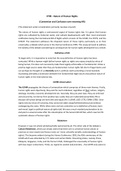IPHR - Nature of Human Rights
(Contention and Confusion over meaning HR)
(The statement under consideration primarily revolves around):
The nature of human rights a controversial aspect of human rights law. It is given that human
rights are cultivated by historical social, and cultural developments with their most prominent
codification being the International Bill of Rights which consists of the UDHR, the ICCPR, and the
ICESCR. The statement addresses the disputed nature of these rights, particularly as to their
universality, a debate which arose in the Vienna Conference 1993. This essay will seek to address
the validity of this debate considering its consequences for human rights development as a whole.
Definition of HR
To begin with, it is imperative to note that the very definition of human rights has been
contested. While a layman might define human rights as rights one enjoys simply by virtue of
being human, this does not necessarily make them legally enforceable or fundamental. Unless a
positive legal source states that they are fundamental, human rights fall short of legal claims and
can perhaps be thought of, as Donnelly puts it, political claims providing a moral standard,
illustrating ultimately a distinction between the fundamental legal nature and political nature of
human rights in the international law.
UDHR-Universalism
The UDHR propagates the theory of universalism which comprises of three main themes. Firstly,
human rights exist objectively, they exist for each individual, regardless of their culture, religion,
ideology, morality, economic development etc. Secondly, they pre-exist laws; they are enforced
and ensured by, not derive from positive law. Lastly, they are inalienable (preamble).This is
because all human beings are born free and equal (Art 1 UDHR, USDI 1776, FDRM 1789). Since
rights exist by virtue of humanity, they cannot be taken away/forfeited/denounced without
endangering the same. While (there were and are contention as to definition of human, basis
and moral, legal or political nature of rights but) this was a much needed proclamation to try
and posit a universal value after the catastrophes of the Second World War, which saw horrific
systematic abuses of human rights.
Relativism
However, it was not whole wholeheartedly welcomed by all. The other side of the debate is
Cultural Relativism, which put simply claims that there are no universal human values or
practices or even needs (and hence insists on ‘more culturally variable understandings of human
rights). This became evident during the Vienna Conference 1993, the 45th anniversary of the
UDHR which was attended by 171 states and certain NGOs. Dissenting states, namely China,
Malaysia, Singapore, Cuba, and the former USSR, challenged the universality of human rights
with two major contentions. Firstly ,as regard to content and priorities, , the UDHR only caters to




